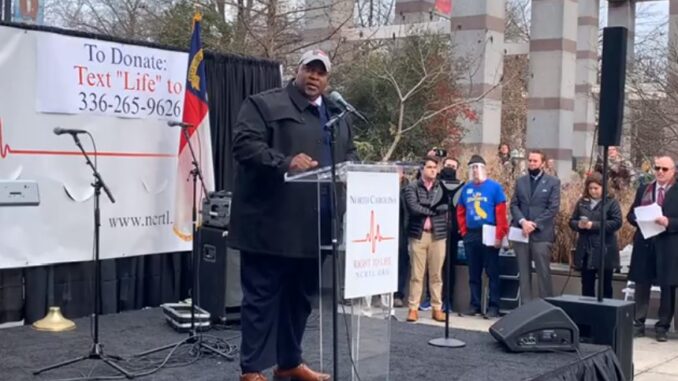
RALEIGH — The annual downtown Raleigh pro-life march, put on by North Carolina Right to Life, gathered Jan. 16 despite cold weather, extra inauguration security around the state Capitol and COVID restrictions. Dr. Bill Pincus, president of NCRTL, told NSJ on Jan. 18 the event went well and he’s heard a lot of positive feedback about having Lt. Gov. Mark Robinson and former U.S. Rep. Mark Walker (R-NC6) as speakers. Pincus also described the group’s legislative agenda for the 2021-22 General Assembly’s session.
“It was kind of a brisk day,” Pincus said. “I was out there early, and by the time it was over, I was frozen. And I think we would have had a bigger turnout, but COVID made some of the older folks, I’m sure, a little bit concerned. Then there was that threat of armed violence at the state capitols last weekend. But overall, I think it went very well.”
Pincus said the music, put on by a band from Life Community Church, was a hit, as were the speeches by Robinson, Walker and others.
Judging by crowd response, Robinson was the highlight of the event.
“This is the reason why we’re all standing here in the cold right now; because we know and believe that life begins in the womb, and the protection of life begins thereof,” Robinson told the crowd. “It is our mission to carry that banner. You know, 100-and-some-odd years ago, there were some other folks who stood where you’re standing that understood that a nation that believed that all men were created equal could not stand and say those words and allow slavery to be on our shores. It is the same with us today. We cannot say that we believe in equality; we cannot say that black lives matter, or all lives matter, or blue lives matter until we say that unborn lives matter.”
The event usually has a march, but Pincus said the city and local police asked them to exclude that element this year.
“They didn’t want me to have the parade, per se, so we ended up having to get a protest permit,” Pincus said.
They also adjusted by adding masks, hand sanitizer and social distancing.
Most years there is a counterprotest by NARAL Pro-Choice North Carolina and some of their allied groups, but there wasn’t evidence on their social media pages of organizing a presence this year.
“I never actually saw them, but I was told that they were on an opposite corner,” Pincus said. “It was not like last year where they were right behind us with their bullhorn and vulgarities. So that was kind of nice to not have them right behind us.”
With session beginning earlier in the week, Pincus said they are already making progress speaking with legislators about N.C. Right to Life’s legislative agenda.
“We had four bills that were keyed-up and ready to go in the last long session,” Pincus said. “We tried to get the Born Alive Survivors Act passed. (Gov.) Roy Cooper had vetoed it, and we were able to override the veto in the Senate, but we could not do it in the House, so the veto was sustained. That bill basically says that if a baby is born alive from a botched abortion, you need to treat the baby just like any other baby.”
This session, the group will try to get the bill through again and hopes there are enough votes to override the likely Cooper veto. The Senate had overridden the veto with the 30 of 50 votes needed, but they have since lost one seat, possibly meaning they’d come up one vote shy.
The override failed 67-53 in the House, five votes shy of the 72 they’d need for three-fifths of the chamber. With Republicans gaining four members, the House may also be just a single vote shy if the bill again passes and is vetoed.
The other three bills on NCRTL’s agenda would likely see similar partisan breakdowns. One is a bill to require informed consent on the possibility of reversing an RU-486-induced abortion. Another is a bill to ban using what Pincus calls “dismemberment abortions” on later fetuses, and the last is a ban on abortions on “pain-capable” fetuses later into the pregnancies.
“So those are four bills which we would hope to get through the legislature, and we’ll be working with the House and the Senate to try to get these bills passed and enacted into law,” Pincus said.
Pincus added he wants to pursue the bills as far as they’ll go, even if it is clear the votes aren’t there, because it will give voters a chance to see which members opposed them.
“When elections come up, you can make a good case to say, ‘Look, these guys are very anti-life.’ You can use that and use those vetoes to establish a pattern. And you can hold people accountable by that.”


